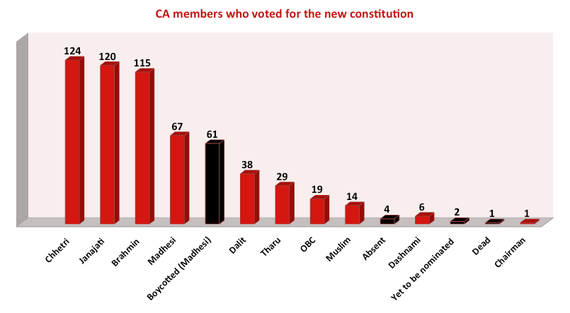The message from New Delhi seems to be that the economic blockade on Nepal will be completely lifted only when the demands of the protesting Madheshis and Tharus, especially on province demarcations, are met. This is the reason it is sending essential supplies into Nepal in fits and starts. It will send enough to ensure Kathmandu doesn't choke to death, but nearly not enough to bring life in the capital and other major cities in Nepal back to normal. This is a dangerous ploy. New Delhi appears to have calculated that Kathmandu has no option but to eventually accede to its demands. China, in this calculation, won't come to Nepal's rescue, not at the cost of alienating India, with which the Middle Kingdom enjoys a whopping US $40 billion trade surplus. Any help that is forthcoming from China, India reckons, will thus be temporary and China cannot in the long run substitute India in Nepal. In this the Indian political establishment may actually be right: China may not be ready to assume the role of Nepal's close strategic partner, and sooner or later Kathmandu may have to bend to India's will. But seldom is the game of geopolitics so simple and straightforward.
The level of proximity between China and Nepal depends not just on Beijing's geopolitical calculations. It is also a factor of how willing Nepali politicians and the broader electorate are in favor of closer Sino-Nepal ties. Given India's disproportionate influence in Nepal, there is bound to be a level of anti-India sentiment in Nepal at all times. But over the past two weeks of the Indian economic blockade, this sentiment has been strengthened manifold, much to the delight of the old Pahade politicians. Many top politicians who had once been ardent supporters of closer India-Nepal ties have now started speaking of the need to open up more trade routes with China. The Tatopani-Kathmandu road, impeded after the Great Earthquake, is expected to come into operation in the next few days. The government, we understand, is thinking about developing at least two more trade roads with Tibet. In short term, this might be inconsequential. But in the long run there is now a distinct possibility that the situation of Nepal's complete reliance on India for vital necessities, including fuel, will come to an end, and not just because of new linkages with China. After the economic blockade, there will also be an effort to diversify away from Nepal's two big (and often fickle) neighbors.
Diversifying its economic ties beyond India will undoubtedly be in Nepal's interest. In today's multi-polar world, no country can afford to put all its eggs in the same diplomatic basket. New Delhi, as such, might have unwittingly pushed Nepal a little away from its 'sphere of influence'. The longer the economic blockade continues, the greater will be this distance. Again, in the end, New Delhi might get what it wants from the ongoing standoff with Kathmandu, but the real price of India's recent "sledgehammer diplomacy" (in the words of an Indian commentator) will only be apparent years and decades down the road.
This was first published on http://www.myrepublica.com/editorial/story/29291/pound-foolish.html
